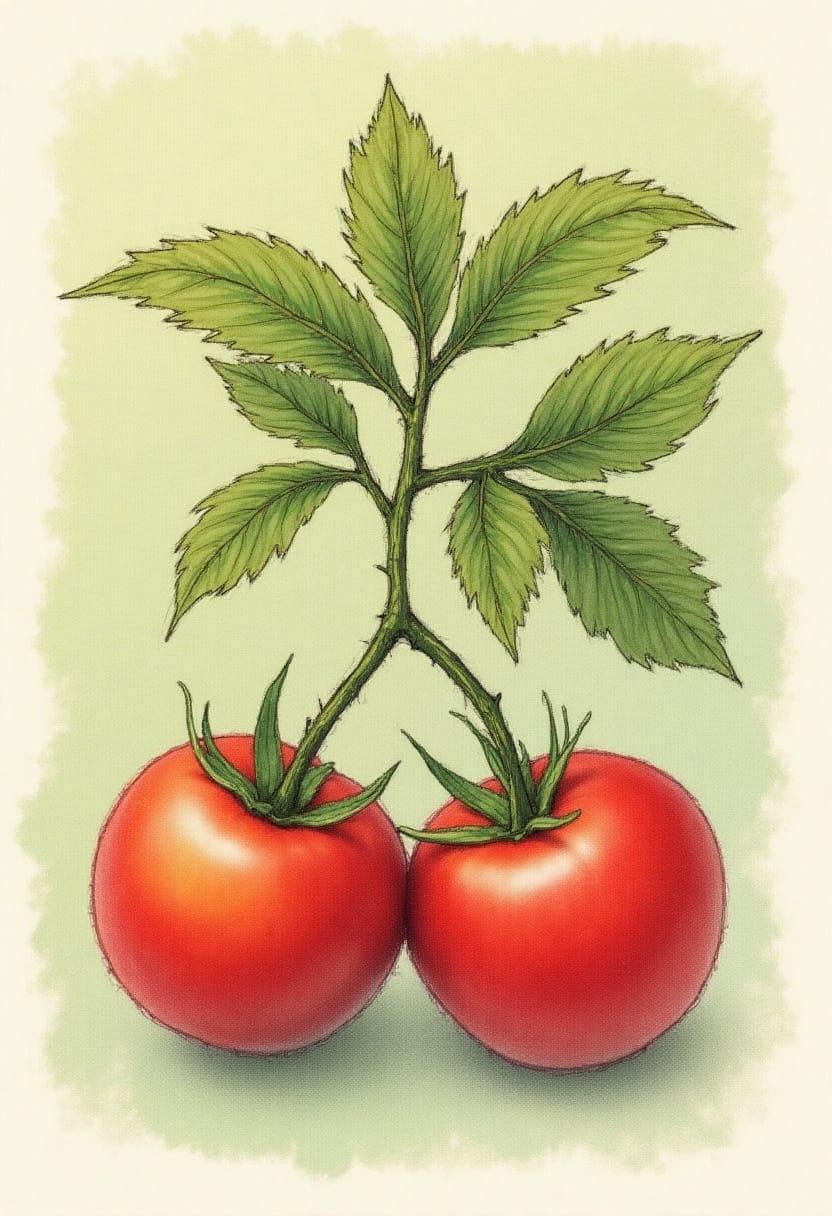Blight On Tomatoes Pictures
- caricature /
- tomato picture /
- Blight On Tomatoes Pictures

Tomato blight often shows up as dark, greasy-looking spots on leaves—like Mother Nature spilled her coffee. It spreads super fast when the weather’s wet and humid, making gardens look like ghost towns overnight. Some fungi behind blight can even survive winter in dead plant bits—so clean up your garden like it’s spring cleaning for survival.

Early blight tends to start with bullseye-shaped spots—like little targets daring you to notice. Late blight, on the other hand, causes big brown patches and fuzzy white mold, almost like someone spray-painted mildew. In drawings, you can exaggerate these patterns for a dramatic “plant horror movie” look.

Blight On Tomatoes Pictures can help you spot the difference between water damage and true disease. Adding a sad tomato face in your illustrations? Totally acceptable and oddly effective. Tomato stems with blight often look like they’ve been singed, which you can draw like a torch passed too close.

Tomato blight spores travel through the air and water—think of them as tiny parachuters with bad intentions. A great visual is to draw spores like sneaky space invaders coming in with clouds and raindrops. Some resistant tomato varieties have leaves with a leathery texture—depicting this helps educate and entertain.

Tomato leaves with blight often curl and twist like they’ve just heard bad news. You can create visual contrast in your drawings by showing a healthy tomato next to a blighted one. Blight on Tomatoes Pictures often feature leaves turning from green to black, like nature’s version of a mood ring.

You’ll often see blight starting on the lower leaves first, because that’s where rain splashes the most. Try showing droplets bouncing off the soil and carrying the blight up to the plant. Leaf veins may stay green while the rest turns brown—use that contrast for a dramatic, almost X-ray-like effect.

Infected tomatoes sometimes show brown, sunken spots that look like bruises from a bar fight. Drawing cross-sections of blighted tomatoes helps viewers see how deep the damage goes. Blight can cause leaves to fall early—your art could show a once-lush tomato plant now looking like a Halloween prop.

Tomato blight loves warm, wet conditions—almost like it booked a spa vacation on your plant. If illustrating environments, add foggy or rainy backgrounds to hint at ideal blight weather. You can personify blight as a sneaky villain—cloak, scythe, and all—sneaking into your veggie patch.

Blight On Tomatoes Pictures also help gardeners identify early signs before it's too late. Focusing on the progression—spot to blotch to full-leaf collapse—makes your visuals educational. Add little arrows or zoom-ins to show blight’s spread step by step like a detective case.

Tomato flowers can be hit too—sometimes they shrivel up before fruit even appears. Draw blossoms turning black at the tips like they’ve been kissed by frost. Use your artwork to show how blight doesn’t just affect the fruit—it attacks the whole plant system.

Spores can land on gardening tools—your illustrations could include infected shears or gloves. Comics showing tomatoes warning each other like a plant gossip circle can add humor. Blight-infected fruit often rots quickly—drawing them half fresh, half mushy adds a “before and after” vibe.

Tomato blight is a classic example of how a tiny organism can ruin big dreams. You could depict hopeful gardeners slowly turning into frustrated ones as blight takes over. Showing a time-lapse effect in your art—healthy plant to skeleton—can hit home emotionally.

Early and late blight are caused by different pathogens, but both love weak spots in your plants. Use visual metaphors like tiny cracks or open doors to show where infections begin. Insect sidekicks can make fun additions—blight-loving bugs cheering it on like a twisted sports team.

Leaves affected by blight often fall off with just a gentle touch. Illustrating hands gently brushing the plant and triggering a leaf avalanche can be powerful. Fallen leaves can become carriers—draw them with little arrows pointing back to the plant as if plotting revenge.

A healthy tomato plant can fight back if caught early—add superhero vibes to resistant varieties. Blight On Tomatoes Pictures might show one tomato hero saving others with a shield or magic spray. Playing with scale—giant spores vs. tiny tomato defenders—can add epic flair to your scenes.

Blight doesn’t just kill leaves—it can ruin the plant’s ability to photosynthesize. Use dark shadows over leaves to show the light being “sucked away” like in a vampire flick. A visual showing sick plants under cloudy skies and healthy ones under sunshine adds clarity.

Tomato blight outbreaks can spread quickly through a neighborhood garden. Draw maps or rows of plants falling like dominos to emphasize the danger. Using comics or sequential panels shows how one bad leaf can lead to disaster.

Mulching helps prevent soil splash—draw mulch like a protective blanket tucking in your tomatoes. Watering at the base, not from above, keeps leaves dry—show watering cans aiming low like secret agents. Include “do” and “don’t” illustrations side by side for simple educational comparisons.

Some gardeners use copper sprays—draw this like a glowing force field shielding leaves. Rotate crops and avoid planting tomatoes in the same spot yearly—turn that into a crop rotation dance in your comic. Composting blighted plants is a no-no—illustrate them being burned or bagged with warning signs.

Blight On Tomatoes Pictures can spark curiosity, teach prevention, and even make people laugh. Turning plant disease into visual storytelling is a smart way to educate and entertain. Tomatoes deserve their moment—even if it's in a tragic, fungus-filled drama with flair.
